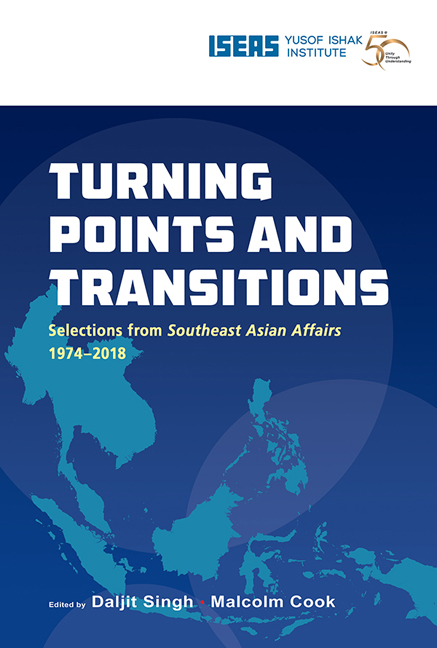Introduction
Published online by Cambridge University Press: 29 May 2019
Summary
Southeast Asian Affairs, the annual publication of the ISEAS – Yusof Ishak Institute, was launched in 1974 as an annual review of the politics, economies and international relations of Southeast Asia and its individual states. It is the only publication of its kind and is used by scholars, think tanks, universities and others interested in contemporary Southeast Asia.
As Professor Donald Weatherbee said in his short commemorative essay in Southeast Asian Affairs 2013 to mark the fortieth anniversary of the publication, “the collected volumes of Southeast Asian Affairs have become a compendium documenting the dynamic evolution of regional and national developments in Southeast Asia from the end of the ‘second’ Vietnam War to the alarms and struggles of today.” The chapters in the publication are written by experts and analysts both from within Southeast Asia and abroad in Australia, Northeast Asia, North America, Europe and India. As Weatherbee put it in the same essay, “A full list of contributors … reads like a kind of who's who in Southeast Asian studies.”
The present publication, Turning Points and Transitions, is produced to commemorate the fiftieth anniversary of the founding of ISEAS in 1968. It comprises a selection of 57 chapters from the 45 issues of Southeast Asian Affairs from 1974, the first year of its publication, to 2018.
The Twists and Turns of International Relations
During these years, Southeast Asia went through major political and economic transformations.
Consider the international relations of the region. The communist victories in South Vietnam, Laos and Cambodia in 1975 crystallized the region's division into two blocs — one communist and the other non-communist. There were alarms then over the intentions of a victorious Hanoi regime with a seemingly invincible “million-man” army supplied by the Soviet Union and China. The nervousness was not unwarranted, given Hanoi's hostile propaganda against ASEAN and its selfcharacterization as the “beachhead” or “vanguard” of socialism in Southeast Asia, which was interpreted in the region as implying that it was only a matter of time before other countries would be “liberated”. With the withdrawal of U.S. military power from the mainland of Southeast Asia, the field seemed open for communism to advance into a strategic vacuum.
- Type
- Chapter
- Information
- Turning Points and TransitionsSelections from Southeast Asian Affairs 1974-2018, pp. xvi - xxPublisher: ISEAS–Yusof Ishak InstitutePrint publication year: 2018

